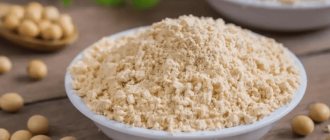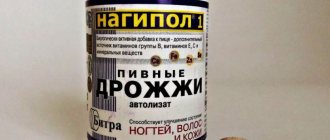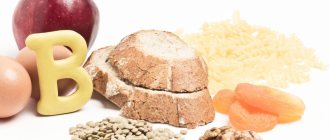Pantothenic acid, or vitamin B5, is one of the water-soluble vitamins. Its intake comes from food, mainly from foods such as liver, kidneys, eggs, whole grain bread, and it is also produced by intestinal microflora. The daily requirement for an adult is 5–10 mg.
Vitamin B5 is absorbed by the intestinal walls, where it is converted into pantethine, a component of coenzyme A, necessary for metabolism in the body. Without it, the oxidation of fatty acids, the synthesis of hormones, the breakdown of organic acids and many other important processes are impossible. With a lack of vitamin B5, all organ systems are affected, primarily the central nervous system, musculoskeletal system, gastrointestinal tract, skin and excretory system. Symptoms of pantothenic acid deficiency are, first of all, a burning sensation in the toes, lethargy, apathy, and fatigue. With severe vitamin B5 deficiency, the so-called “burning feet” symptom occurs - burning, excruciating pain in the legs and their redness, especially at night, which leads to sleep disturbance and exhaustion of the body.
A deficiency of vitamin B5 can occur when absorption in the intestine is impaired (malabsorption syndrome), with certain diseases of the stomach and intestines, with long-term treatment with antibiotics and sulfonamides, more often in children. Excess pantothenic acid is a very rare phenomenon, usually occurs during treatment with vitamin B5 and is manifested by diarrhea and other digestive disorders.
In order to check the level of pantothenic acid in the body, it is recommended to take a blood test for vitamin B5.
What is pantothenic acid?
Pantothenic acid is vitamin B5, a nutrient obtained from food and produced in small doses in the intestines. Its role in the life of the body is enormous, since the vitamin is involved in the metabolism of proteins, fats and carbohydrates - compounds through which all processes in the body take place. Pantothenic acid is also involved in the synthesis of lipids, cholesterol, histamine, hemoglobin and many other vital elements. Once in the body, vitamin B6 is converted into its active form - pantethine, but pantethine and pantothenic acid are different substances.
Release form
Vitamin B5 is available in various forms under different brands. International nonproprietary name – pantothenic acid.
The recipe in Latin looks like this - pantothenic acid.
The acid is produced in tablets for oral administration, in ampoules for intramuscular and intravenous administration, in the form of an ointment for external use, and powder:
- Tablets with a dosage of 0.1 grams are used for outpatient treatment, which is convenient for patients at home. The disadvantage of all tablet forms is the effect on the gastric mucosa, the appearance of side effects in the form of nausea and heartburn.
- Ampoule solutions are available in 10 and 20 percent strengths. Used in hospital settings in cases where a quick effect is required. The advantage is operational impact. Disadvantage: use in specialized conditions, painful procedure, risk of infiltrates.
- The powder is diluted in water, can be used orally, and added in the manufacture of cosmetic masks for the face and hair.
- Topical ointments and sprays are applied to the skin for various injuries. Ointments have a greasy base than sprays and can leave stains on clothes. According to reviews from doctors and patients, they are effective in healing wounds and burns.
How does vitamin B5 affect humans?
As mentioned above, the main function of vitamin B5 is to stimulate protein, lipid and carbohydrate metabolism. But this is not a complete list of why the body needs pantothenic acid. Here is a more complete list of benefits of vitamin B5 and how it affects us:
1. Pantothenic acid for the adrenal glands. Vitamin B5 is important for the functioning of the adrenal glands - paired glands that synthesize hormones. When their functioning is impaired, the production of cortisol and progesterone decreases. The first hormone acts as a regulator of carbohydrate, lipid, protein metabolism and water-salt balance. And progesterone is a sex hormone that affects the menstrual cycle and the course of pregnancy; its deficiency provokes various hormonal diseases.
2. Pantothenic acid for weight loss. Losing excess weight is only possible with proper functioning of the digestive system and healthy metabolism. Vitamin pantothenic acid is involved in lipid metabolism, promotes fat burning to generate energy, and restores intestinal microflora. Thanks to the health of the digestive organs, a person satisfies hunger with less food. However, just taking vitamins is not enough to lose weight: a person must follow a diet and exercise actively - follow the rule of calorie deficit.
3. Pantothenic acid in sports. One of the key conditions for success in sports is proper and balanced nutrition: if an athlete does not have enough of any vitamin, he will not achieve good results. This statement is true for both strength sports and bodybuilding. B5 stabilizes the functioning of redox processes, promotes the production of nutrients for the structure of muscle tissue and helps to absorb all other vitamins that enter the body with food.
4. Pantothenic acid for skin. B5 is involved in the restoration processes of skin cells and mucous membranes. With sufficient levels of the vitamin, wounds heal faster and the likelihood of scarring is much less. In the form of dietary supplements, it is prescribed for diseases that damage the tissues of the mucous membrane: gastritis, stomach and intestinal ulcers - it helps protect organs and reduce pain.
5. Pantothenic acid for the face. Vitamin B5 helps with inflammation and skin diseases: acne, blackheads, ulcers, and so on. It reduces the activity of the sebaceous glands, so it is best suited for oily skin. Vitamin B5 for the face can be taken in the form of oral capsules or topical creams and liquids.
6. Pantothenic acid for hair. Vitamin B5 is no less useful for hair: it strengthens the hair follicle, and thanks to this, accelerates hair growth, protects against hair loss, improves its appearance, and reduces the risk of dandruff. Vitamins are also taken to restore hair health after damage from low-quality care products.
7. Pantothenic acid during pregnancy. During pregnancy, the daily intake of pantothenic acid and other vitamins increases, since a woman needs to provide useful substances not only for herself, but also for her baby. And at this time, the mother’s body experiences additional physical and emotional stress, so vitamin complexes containing pantothenic acid are often prescribed to pregnant women.
Important! During pregnancy, you cannot use dietary supplements without a doctor’s prescription. This also applies to the use of pantothenic acid.
8. Pantothenic acid for the body. In addition to all of the above, vitamin B5 protects the body from physical and psycho-emotional overload, and the nervous system from the destructive effects of alcohol and nicotine, it maintains the health of the cardiovascular system and normalizes blood composition (hemoglobin, sugar and other substances), increases human immunity and its ability to withstand any negative influences.
Why do we need vitamin B5?
Without vitamin B5 it is impossible to imagine a number of important physiological processes:
- Transformation of food into glucose.
- Cholesterol production.
- Synthesis of hormones that affect sexual activity and stress resistance.
- Formation of red blood cells.
The effects of pantothenic acid protect the digestive organs. Without it, the body cannot fully absorb other vitamin compounds, especially vitamin B2.
Pantothenic acid, together with other B vitamins, takes part in the breakdown and absorption of fats, proteins, and carbohydrates. The absorbed elements are processed into energy and contribute to the renewal of muscle fibers, internal organs and tissues.
Coenzyme A
Pantothenic acid is a necessary element for the synthesis of coenzyme A. It takes part in the formation of fatty acids. Under the influence of coenzyme A, food is converted into “good” cholesterol.
Without coenzyme A, sphingosine, a molecule similar in structure to fat, cannot be formed. With its help, chemical reactions take place between the cells of internal organs.
The presence of coenzyme A is necessary for the normal functioning of the liver. It is he who ensures the exchange of medications and the removal of toxins.
Application in medicine
Reducing cholesterol. Medical observations helped to come to the conclusion that the participation of pantothenic acid in the production of triglycerides and lipoprotein metabolism helps to reduce blood lipids. This is extremely beneficial for patients with hyperlipidemia [].
The results of the experiments proved that pantethine, which is a form of vitamin B5, can reduce lipid levels. The effect is achieved by taking large doses of pantethine. A 2005 analysis of 28 medical studies, each involving an average of 22 people, looked at the effects of vitamin B5 on lipid absorption. Participants diagnosed with hyperlipidemia were offered 900 mg pantethine supplements for 12.7 weeks [].
After a month, the subjects' triglyceride levels decreased by 14.2%. After 4 months, a decrease of almost 33% was recorded. Total cholesterol decreased by 8.7% and 15.1%, respectively. The concentration of low-density lipoproteins decreased by 10.4% and 20.1%. At the same time, there was a simultaneous increase in high-density cholesterol. After 1 month, HDL increased by 6.1%, and after 4 - by 8.4%.
Chinese doctors, after the publication of a 2005 review, decided to conduct additional research. To study the effect of vitamin B6 on the concentration of lipids in the blood, 216 adult patients with blood lipoprotein levels ranging from 204 to 576 mg/dL were selected. All subjects received nutritional advice and took coenzyme A 400 units per day or 600 mg pantethine [].
Triglyceride levels decreased by 16.5% after 8 weeks of taking pantethine. With the drug, a decrease in cholesterol concentration was recorded in comparison with the initial values.
Benefits for men
A man's health largely depends on testosterone levels. Vitamin B5 has been proven to provide optimal levels of this anabolic steroid. As a result, a man becomes the owner of lean muscle mass and quickly recovers after exercise. Vitamin B5 helps maintain mood and experience sexual desire.
Application in cosmetology
Vitamin B5 preparations are used to preserve the beauty of hair. The active substance activates the activity of hair follicles and prevents the appearance of early gray hair. Pantothenic acid is added to creams and other care products that rejuvenate the skin.
The journal Medical Hypotheses published data in 1995 that a lack of vitamin B5 may cause acne []. According to the publication, the use of medications containing B5 helps eliminate acne. To date, there are no results from dermatological studies that could confirm this information.
Pantothenic acid is added to face creams, which has the ability to moisturize, soften the skin, and eliminate signs of inflammation. Vitamin B5 is included in regeneration mechanisms and stimulates the synthesis of its own collagen and elastin fibers. It relieves hyperemia, dries out pimples and acne.
Symptoms of hypovitaminosis
Pantothenic acid deficiency is not common, since it is found in many foods, and the daily requirement of vitamin B5 is small: 10–15 mg in adults and 1–5 mg in children. A deficiency of pantothenic acid occurs during stress, during active physical activity, during periods of pregnancy and breastfeeding (at this time the level of pantothenic acid increases several times), as well as during strict diets, extremely poor nutrition, or diseases of the digestive system that reduce the absorption of nutrients. Symptoms of vitamin B5 deficiency are similar to typical symptoms of general hypovitaminosis:
- insomnia, fatigue and decreased performance;
- headaches and dizziness;
- emotional instability and loss of mood;
- muscle pain, burning pain in the legs;
- loss of appetite and nausea;
- digestive system disorders.
Daily value of vitamin B5 for women, men and children
The norm for vitamin B5 is 5.0 mg for adult men and women.
| Categories of people | Daily requirement, mg |
| 0-3 months | 1,0 |
| 0-6 months | 1,5 |
| 7-12 months | 2,0 |
| 1-3 years | 2,5 |
| 3-11 years | 3,0 |
| 11-14 years old | 3,5 |
| Men 14 and older | 5,0 |
| Women 14-18 years old | 4,0 |
| Women 19 years and older | 5,0 |
| Pregnancy | 6,0 |
| Lactation | 7,0 |
Norms of physiological needs for vitamins in the Russian Federation (RF, MR 2.3.1.2432-08)
Where is it kept?
To maintain your vitamin B5 levels, you need to know which foods contain the most pantothenic acid. Vitamin B5 is found in foods of plant and animal origin, and is also independently produced in the human intestine.
| Product | B5 content per 100g |
| Chicken yolk | Up to 9 mg |
| Liver (chicken, beef, duck, pork) | Up to 8.5 mg |
| Bran (rice, wheat, oat) | Up to 7.4 mg |
| Sunflower seeds | Up to 7 mg |
| Kidneys (beef, pork) | Up to 4 mg |
| Mushrooms (shiitake, porcini, champignons) | Up to 3.6 mg |
| Hearts (turkey, chicken) | Up to 3 mg |
| Milk | Up to 2.3 mg |
| Fish of the salmon family (trout, salmon) | Up to 2.2 mg |
| Peanut | Up to 1.8 mg |
| Peas and beans | Up to 1.8 mg |
| Chicken breast | Up to 1.7 mg |
| Carrot | Up to 1.5 mg |
| Avocado | Up to 1.4 mg |
If you consume these foods as part of a balanced diet, then there should be no deficiency of the vitamin. But if you have signs of hypovitaminosis, are actively involved in sports or are often under stress, then using a dietary supplement containing vitamin B5 will not hurt. Among high-quality dietary supplements, 3 brands are common:
- Solgar Pantothenic Acid is a premium food supplement. One jar contains 100 capsules of 550 mg. The main element is vitamin B5, the capsule shell consists of cellulose, calcium phosphate and stearic acid. The cost of Solgar Pantothenic Acid is 1540 rubles.
- Now Pantothenic Acid is a drug from an equally well-known company for the production of dietary supplements. The package consists of 250 capsules containing 500 mg of vitamin, each capsule additionally contains 45 mg of calcium. The soft tablet consists of edible gelatin. Price Now Pantothenic Acid – 1500 rubles.
- Solaray Pantothenic Acid is another high-quality dietary supplement based on B5. Solaray's supplement also contains 250 capsules containing 500 mg of vitamin and 45 mg of calcium. The cost of Solaray Pantothenic Acid is 1850 rubles.
How to take the dietary supplement?
Before starting use, you must read the instructions for use of pantothenic acid. The rules for taking the dietary supplement are simple: one capsule per day with meals, the tablets should be washed down with a sufficient amount of water. The dosage of pantothenic acid in a capsule is much higher than the daily requirement, so you should not take more than 1 tablet per day. You can take pantothenic acid at any time: during breakfast, lunch or dinner. The duration of the course is usually prescribed by a doctor, but if a person independently decides to use a dietary supplement, then the recommended duration of the course is 4–6 weeks, after which it is worth taking a break for 2–3 weeks.
Overdose
Hypervitaminosis B5 is a fairly rare phenomenon. It can occur when a large amount of a substance is taken at once, when taken uncontrolled by a child, or when used for a long time in large dosages. Symptoms of hypervitaminosis:
- nausea;
- vomit;
- loose stool.
First aid for acute poisoning consists of gastric lavage and the use of adsorbents. Further assistance should be provided in a specialized medical facility.
Harm, side effects and contraindications
There are no restrictions on the maximum permissible daily intake of vitamin B5: exceeding the daily intake does not cause side effects. Excess pantothenic acid is excreted from the body through urine, as it is a water-soluble vitamin. Pantothenic acid is found in many foods and is produced in the body itself, so allergic reactions to it do not occur. It is well tolerated by the body at any age, but in some people large doses still cause digestive disorders. In this case, the drug should be stopped.
You should consult your doctor before taking pantothenic acid if you are pregnant, breastfeeding, taking medications, or have digestive problems. There are no direct contraindications for taking the vitamin during these periods, since the harm of pantothenic acid has never been documented, but extra precaution certainly won’t hurt. There are only two contraindications to the use of the vitamin: with hypervitaminosis, which is rare and asymptomatic, and with hemophilia (excess vitamin can increase blood clotting time). In other cases, the benefits of pantothenic acid along with its complete harmlessness make it an excellent dietary supplement for any person.








